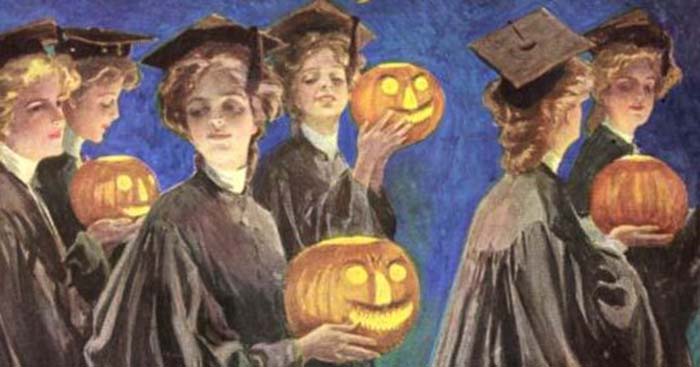Trick-or-treating may have originated with Hallowmas caroling (or souling as it was known in mediæval times). But that doesn’t mean tricks and treats have to be pranks and candy. So this Hallowe’en, why not partake in All Hallow’s Read by tricking a friend with a terrifying tale or treating a child with a spooky story?
Etymology of ‘Halloween’
Most fans of Halloween probably know that the word Halloween (or sometimes Hallowe’en) is a shortening of All Hallows Eve. But do you know what All Hallows Eve actually is? Well it’s the night before All Hallows Day, of course! The term eve is itself a shortening of the word evening.1
All Hallows Day originated as a Catholic holiday taking place on the 13th of May celebrating all the saints (aka hallows) who don’t already have their own holidays. Established by Pope Boniface IV in the year 609, the date was likely chosen as an attempt to replace the Roman holiday of Lemuralia.2 On this day, ancient Romans attempted to assuage the restless dead with offerings of sweets, foods and early harvests.
About a century later, All Hallows Day was moved to “November 1 by Pope Gregory III in the mid-eighth century as a day dedicated to the saints and their relics.”3 The move was likely an attempt to replace the Gaelic holiday of Samhain. On this day, the Celts, Gaels and early people’s of the British Isles celebrated the death of the Summer and the coming of Winter.
On November 2nd, Catholics created the holiday All Souls Day which celebrates all people regardless of their sainthood. In Mexico, All Souls Day is known as Dia de los Muertos, or the Day of the Dead.
All Hallows Read
A forgotten Halloween tradition that inspired trick-or-treating is the English custom of ‘souling’. Souling was very similar to Christmas caroling or wassailing. Basically, the Halloween soulers would go from home to home singing annoying songs or hymns in exchange for sweets, wassail or ‘soul cakes’.4. Soul cakes are basically little shortbread cookies with spices and raisins or other dried berries on them in the shape of a cross. Kinda like hot cross buns.
Wassail is a drink similar to mulled cider originating among the Danish immigrants/invaders of England. Wassail comes from the Old Norse ves heill meaning ‘be healthy’. 5 Wassailing is usually associated more with Christmas, but wassailers, singers, carolers and mummers were sort of like your annoying improv friends from college. They enjoyed any reason to be extra in public.
This practice of sharing song and stories on holidays leads pretty well into Neil Gaiman’s proposed new tradition he calls ‘All Hallow’s Read’:
Handing out literature when children yell “Trick or treat!” (or as the Peanuts gang say, “Tricks or treats!”) may be grounds for getting you house egged. But telling ghost stories around a bonfire is a great way to bond with friends in the way humans have for thousands of years. And passing around a scary book is as great a way to prep for Hallowe’en as watching horror movies or listening to campy 80s metal.
- ‘eve‘ | Online Etymology Dictionary
- “All Saints’ Day” | Catholic Online
- ibid
- “Catholic Recipe: Soul Cakes III” | Catholic Culture
- “wassail” | Online Etymology Dictionary

